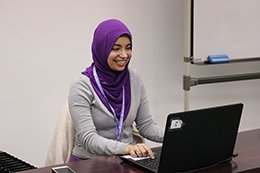Providing Broad Support for Japanese-Language Education in the Middle East and North Africa
The Japan Foundation, Cairo
ARISUE Jun
Hello, everyone. I am ARISUE Jun, and since November 2020, I have been working as the Japanese-Language Chief Advisor dispatched to the Japan Foundation, Cairo in Egypt. The area under my jurisdiction covers not just Egypt but 22 other countries and regions. Unfortunately, due to the global COVID-19 pandemic, it has not been possible to provide direct support through in-person visits that were once the norm, but instead I have been devising ways of creating connections as much as possible in an online environment.
The Middle East and North Africa is one of the regions of the world with the fewest Japanese-language learners. That does not mean, however, that there is no enthusiasm for the Japanese language! At the Japan Foundation, Cairo, we are actively providing support for both Japanese-language learners and teachers.
1. Japanese Short Film Contest in the Middle East and North Africa
With movements restricted due to COVID-19, we held the Japanese Short Film Contest in the Middle East and North Africa to introduce more people to the attractions of the Middle East and North Africa region. A total of 97 people in 47 teams from eight countries participated, on the theme of “My Town.” They introduced their towns in Japanese language, showing us desert landscapes, crystal clear seas, green villages, major cities, and historic remains.
https://www.youtube.com/playlist?list=PLM72BelRsx1Mc0kbsHYkyODaUZOudOX-H
Please take a look! You will be surprised by the diversity of the Middle East and North Africa!
2. Middle East and North Africa Japanese-Language Education Symposium
To date, the Japanese Education Seminar in the Middle East and North Africa has been held in Cairo, and 2021 should have marked the 20th occasion for it to have been held. However, the pandemic forced us to cancel a face-to-face seminar. Instead, in March 2021 we held the Middle East and North Africa Japanese-Language Education Symposium online. Under the overall theme of “Thinking about Japanese-Language Education in the Middle East and North Africa” through a mixture of non-synchronized video listening sessions and synchronized Zoom sessions, approximately 250 participants from around the world, including the Middle East, North Africa and Japan, attended the symposium, which included online keynote speeches and workshops by specialists, an online Japanese-language education idea showcase, general presentations, and roundtable discussions on the situation for Japanese-language education in the region.
The contents of the symposium have been archived and are available to view here:
https://www.youtube.com/playlist?list=PLM72BelRsx1OitRLQHNGvO-caI7OOpng2
3. JF x Palestine: Online Japanese-Language Course

Online class for learners in Palestine, led by a teacher from the Japan Foundation, Cairo
Through cooperation between the Japan Foundation, Cairo and the Representative Office of Japan to Palestine, the first-ever Japanese-language course was implemented online in Palestine. The course was a combination of self-learning and Zoom-based live sessions using JF Japanese e-learning Minato, and approximately 90 people participated, mainly university students with an interest in anime. The teacher for the course was a veteran Egyptian teacher at the Japan Foundation, Cairo, who is highly skilled in holding online courses. She is also able to interact with participants in Arabic, meaning that learners taking an online Japanese-language course for the first time could take the class without having to worry. After completing the three-month course, even complete beginners were able to speak about themselves fluently in well-pronounced Japanese language, and I was surprised at the speed at which they progressed. In the Middle East and North Africa region that the Japan Foundation, Cairo is responsible for there are many people who cannot study, even though they want to. Although the region is large, all the staff at the Japan Foundation, Cairo are working hard to utilize online technologies so that more people can encounter the Japanese language.
4. Training Course for Japanese-Language Teachers
Although the number of Japanese-language learners in Egypt is increasing, there are no educational institutions where you can engage in specialized study about Japanese-language education. That is why the Japan Foundation, Cairo holds a Japanese-language teacher training course each year. In FY2020, the practical part of the course was conducted online. The four trainees, including both non-native and native Japanese-language speakers, taught the Japanese language to learners recruited online, through a combination of non-synchronized tasks including preparation and homework, and synchronized Zoom-based classes. Online classes have become the norm in the region, making this training course one that is responding to the needs of the times. Based on the knowledge accumulated through the teacher training course and with the cooperation of the Japan Foundation, Cairo, Cairo University launched a diploma course in Japanese-language teacher training from the end of March 2021.
5. Japanese Pop Culture in the Middle East and North Africa

Mirai e Jump Rebanon No. 1 (Jump to the Future Lebanon No. 1)
It may come as a surprise to some people, but Japanese pop culture, like anime and manga, is popular in the Middle East and North Africa, and it is this popularity that is a big motivator for people to start learning Japanese language. As noted above, many of the Japanese-language learners in Palestine are anime fans, and I was amazed at how good their pronunciation is, making it hard to believe they are beginners. Another particular feature of the popularity of pop culture is that it often leads to creativity. For example, Mirai e Jump Rebanon No. 1 (Jump to the Future Lebanon No. 1), a magazine modeled on Japanese youth manga was published in Lebanon with the support of a grant from the Japan Foundation, Cairo. The future is already here, with the creators of the Middle East and North Africa sending out their work to the world in the Japanese language.
- What We Do Top
- Arts and Cultural Exchange [Culture]
- Japanese-Language Education Overseas [Language]
- Japanese-Language Education Overseas [Language] Top
- Learn Japanese-language
- Teach Japanese-language
- Take Japanese-Language Test
- Know about Japanese-language education abroad
- The Japanese-Language Institute, Urawa
- The Japanese-Language Institute, Kansai
- Japanese-Language Programs for Foreign Specified Skilled Worker Candidates
- Japanese Language Education for Japanese Children Resident Overseas and for the Descendants of Migrants
- Archives
- Japanese Studies and Global Partnerships [Dialogue]
- JF digital collection
- Other Programs / Programs to Commemorate Exchange Year
- Awards and Prizes
- Publications
